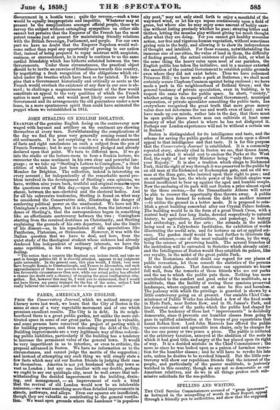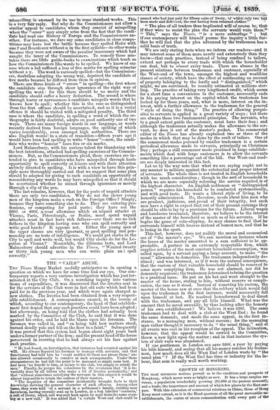SPELLING AND WRITING.
THE Civil Service Commissioners accused of "gross ignorance" as betrayed in the misspelling of words in their Report, appeal through a friendly pen to authorities, and show that we supposed. misspelling is excused by its use in some ertauclard-works. This is a very fairreply. But why do the Commissioners not allow a similar appeal to candidates whom they convict of misspelling when. the "error" may simply arise from the fact that the candi- 'date had-read one History of Europe and the Commissioners an- other. For instance, we dare say some candidates in close compe- titions may have lost the battle because they spelled Hofer with one f and Bourdeauxwithontm in the first syllable—in other words because they were not aware of the peculiar inaccuracy 'whichhad caught the fancy of the Commissioners. To remedy these mis- takes there are little guide-books to examinations which teach us how the Commissioners like words to be spelled. We know of one case where a lad suffered a loss of five marks for spelling scimetar without a The word is variously spelled—but the Commission- ers, doubtless adopting the wrong way, deprived the candidate of five marks because he differed from them in opinion. Mere are three kinds of "errors " in spelling—the first where the candidate sins through sheer ignorance of the right way of spelling the word : for this there should be no mercy and the candidate should suffer a heavy deduction. The second is where through hurry or nervousness a candidate misspells words that he knows how to spell ; whether this is the case as distinguished from the first offence should be ascertained, and as it is a venial offence it should be visited with a mitigated penalty. The third case is wherethe candidate, in spelling a word of which the or- thography is fairly doubtful, adopts on good authority one of two ways. There are many foreign words in our language, or words recently derived from foreign languages, the spelling of which varies considerably, even amongst high authorities. There are also English words, in a state of transition—fifteen years ago it -would have been bad spelling to write "honor "—now, the candi- date who writes 44honour " loses five or six marks.
Lord Malmesbuiy, with his curious talent for blundering with the best intentions, attacked bad spelling exercises of the Commis- sioners. But, as the Commissioners plead, these exercises are in- tended to give to candidates who have misspelled through haste opportunity to spell correctly at leisure and with their attention entirely directed to spellinF. It is with a view to have this prin- ciple more thoroughly earned out that we suggest that some plan should be adopted for giving to each candidate an opportunity, of reconsidering any words he may have misspelled so that it should he ascertained whether he sinned through ignorance or merely through a slip of the pen. The fact remains, however, that for the posts of unpaid attaches -there are only two candidates. Why do not the clever young men of the kingdom make a rush on. the Foreign Office ? Simply, because they have something else to do. They are entering pro- fessions, or competing for paid posts ; they have not the SOO/. or 400/. a-year allowance which an unpaid attaché at Vienna, Paris, Petersburgh, or Berlin, must spend unpaid attaches must in fact have rich fathers—are there are no rich fathers in the kingdom having sons who can spell correctly and write good hands ? It appears not. Either the young men of the upper classes are very ignorant, or good spelling and pen- manship are no tests of intelligence. We could get clerks in the City to spell and -write well, but would City clerks do for the Le- gation at Vienna?' Meanwhile, the dilemma lasts, and Lord I Malmesbury should advertise in the Times, "Wanted twenty -or thirty rich young men who can write plain ant spell ! correctly."



























 Previous page
Previous page